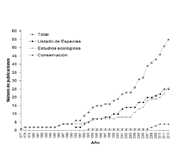Urban ornithology studies in Colombia: a literature review
Main Article Content
Keywords
urban birds, urban biodiversity, conservation, urban ecology.
Abstract
This paper reviews what has been published in peer-reviewed journals about birds in Colombian cities, complementing an important Latin American review article that was recently published. This review identifies 55 papers dealing with 12 Colombian cities which exceeds by 50 the the number of studies previously considered. Species lists and Ecological Studies are the most frequent studies. Medellín is the city with the most studies (26 papers), whereas Bogotá (nine), Cali and Popayán (four each) had fewer publications. Although our review detects important publications not previously considered, we conclude that urban ornithology in Colombia is still in its infancy considering the duration, number, quality, impact and depth of studies so far published.
PACS: 87.23.-n
MSC: 92D40
Downloads
References
[2] A. M. Cuervo, P. C. Pulgarín-R, D. Calderón-F, J. M. Ochoa, C. A. Delgado- V, A. Palacio, J. M. Botero, and W. Múnera, “Avifauna of the Northern Cordillera Central of the Andes, Colombia,” OrnitologÍa Neotropical,, vol. 19, pp. 495–515, 2008.
[3] J. Fjeldså, M. D. Álvarez, J. M. Lezcano, and B. León, “Illicit crops and armed conflict as constraints on biodiversity conservation in the Andes region,” Ambio, vol. 34, pp. 205–211, 2005.
[4] A. Henderson, S. Churchil, and J. Luteyn, “Neotropical plant diversity,” Nature, vol. 351, pp. 21–22, 1991.
[5] M. L. McKinney, “Urbanization as a major cause of biotic homogenization,” Biological Conservation, vol. 127, no. 247-260, 2006.
[6] J. C. Verhelst, J. V. Rodríguez, O. Orrego, J. E. Botero, J. A. López, M. V. Franco, and A. M. Pfeifer, “Aves del municipio de Manizales – Caldas, Colombia,” Biota Colombiana, vol. 2, no. 265-284, 2001.
[7] E. Biamonte, L. Sandoval, E. Chacón, and G. Barrrantes, “Effect of urbanization on the avifauna in a tropical metropolitan area,” Landscape Ecology, vol. 26, pp. 183–194, 2011.
[8] P. Schnitter, M. L. Giraldo, and J. M. Patiño, “La ocupación del territorio en el proceso de urbanización del área metropolitana del Valle de Aburrá, Colombia,” Scripta Nova, vol. 10, pp. 741–798, 2006.
[9] J. L. Vásquez-Muñoz and G. J. Castaño Villa, “Identificación de áreas prioritarias para la conservación de la avifauna en la zona urbana del municipio de Medellín, Colombia,” Bol Cient Mus Hist Nat, vol. 12, pp. 51–61, 2008.
[10] P. no Z., G. J. Castaño V., and J. C., “Cambios en la composición de la avifauna en Santa Helena durante el siglo XX,” Crónica Forestal y del Medio Ambiente, vol. 15, pp. 137–161, 2000.
[11] T. Donegan, J. E. Avendaño C., B. Huertas, and P. Flórez, “Avifauna de San Pedro de los Milagros, Antioquia: una comparación entre colecciones antiguas y evaluaciones rápidas,” Bol Cient Mus Hist Nat, vol. 13, no. 63-72, 2009.
[12] P. Salaman, T. M. Donegan, and R. Prys-Jones, “A new subspecies of Brownbanded Antpitta Grallaria milleri from Antioquia, Colombia,” Bulletin of the British Ornithologist Club, vol. 129, pp. 5–17, 2009.
[13] A. Bárcena, “Evolución de la urbanización en América Latina y el Caribe en la década de los noventa: desafios y oportunidades,” La Nueva Agenda de América Latinarica Latina, vol. 790, no. 51-61, 2001.
[14] L. G. Naranjo, “El arcno de la ornitología colombiana,” Ornitología Colombiana, vol. 7, no. 5-16, 2008.
[15] S. Córdoba-Córdoba, “Historia de la ornitología colombiana: sus colecciones científicas, investigadores y asociaciones,” Boletín SAO, vol. 19, no. 1-26, 2009.
[16] U. Campo, La urbanización en Colombia. Bogotá: Ediciones Suramérica, 1977.
[17] R. Ortega-Álvarez and I. MacGregor-Fors, “Dusting off the file: A review of knowledge on urban ornithology in Latin America,” Landscape and Urban Planning, vol. 101, pp. 1–10, 2011.
[18] R. Ortega-Álvarez and I. MacGregor-Fors, “Spreading the word: the ecology of urban birds outside the United States, Canada, and Western Europe,” The Auk, vol. 128, pp. 415–418, 2011.
[19] ABO, Aves de la Sabana de Bogotá: guía de campo, quebecor i ed. ABO y CAR, 2000.
[20] SAO, Aves del Valle de Aburrá, E. Colina, Ed. Área Metropolitana, 1999.
[21] C. A. Delgado-V. and K. French, “Parasite-bird interactions in urban areas: Current evidence and emerging questions,” Landscape and Urban Planning, vol. 105, pp. 5–14, 2011.
[22] C. A. Delgado-V., “Editorial,” Boletín SAO, vol. XIV, p. 1, 2004.
[23] R. E. Major, The Natural History of Sydney. Mosman: Royal Zoological Society of New South Wales, 2010, ch. Using muse, pp. 234–240.
[24] K. J. Gaston, Urban Ecology. Cambridge: University Press, 2010.
[25] J. F. Chase, F. J., and J. Walsh, “Urban effects on native avifauna: a review,” Landscape Urban and Planning, vol. 74, pp. 46–69, 2006.

